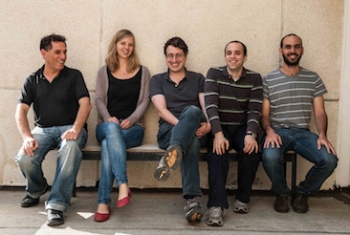Apr 11 2013
Researchers at the Technion-Israel Institute of Technology have developed and successfully demonstrated a photonic Floquet topological insulator, a new device used to protect the transport of light through a unique, lattice of 'waveguides.' The advancement may play a key role in the photonics industry. A description is published in the current issue of NATURE (11 April 2013).
 Technion research team
Technion research team
The photonics industry is at the heart of modern computing and communication. It has allowed vast amounts of data to be transmitted extremely quickly over fiber optic lines that cross the oceans. Photonic technology (i.e., technology that is based on the flow and control of light) is at the heart of DVDs, fabrication of computer chips, and solar cells.
As computers get faster and computer chips get denser, there is a need for smaller and smaller devices that manipulate light. But when devices get smaller, imperfections in the fabrication processes can play a large role, making light move irregularly and unpredictably. In other words, there’s a need for a new methodology to prevent unwanted scattering from any kind of defect.
Researchers in the group of Prof. Mordechai (Moti) Segev at the Technion, in collaboration with the group of Prof. Alex Szameit at the Friedrich-Schiller University in Jena, Germany, have done exactly that. Using a lattice-work of ‘waveguides’ (which are like wires that guide light instead of electricity), the researchers have experimentally demonstrated a ‘photonic topological insulator.’ The researchers used an array of helical ‘waveguides’ (shaped like curly hairs) arranged in a ‘honeycomb’ lattice structure, similar to the pattern observed in beehives. In such a structure, where each waveguide is thinner than a tenth of a human hair, light is ‘topologically protected,’ which means it flows uninterrupted despite the presence of defects.
According to Segev, “topological protection means that light simply flows around imperfections essentially without noticing them.”
Topological protection was first conceived not for light, but for electrons flowing in a solid material. However, Dr. Mikael Rechtsman and Mr. Yonatan Plotnik from the Technion, figured out how to bring topological protection into photonics, using an array of waveguides that interact with one another. The additional step needed to achieve topological protection was to make the waveguides helical (in the shape of a helix), rather than straight. “The helical nature of the waveguides breaks the symmetry, so that in the forward direction the waveguides are spinning clockwise, and in the backward direction, counterclockwise“ said Rechtsman. “In our procedure, this is an essential ingredient in preventing unwanted scattering.“
“Photonic topological insulators have the potential to provide an entirely new platform for probing and understanding topological protection,” explained Rechtsman. “For example, all sorts of experiments that would be difficult or impossible to carry out in solid-state materials can now be accessed using light.”
“Such new ideas might one day be an important part of the optical communication industry, being robust to scattering and disturbances: a super conductor of light,” added Plotnik.
“This discovery is another step in the progress towards optical and quantum computing,” said Julia Zeuner, a graduate student at Friedrich-Schiller University in Jena, who fabricated the sophisticated photonic structure and did part of the experiments. Her contributions, and those of her PhD advisor (Szameit), were absolutely crucial, and manifested a long standing Israeli-German collaboration between the teams. “We have discovered a completely novel phenomena,” concluded Segev, “and new phenomenon are destined to find applications in directions that we can’t even imagine.”